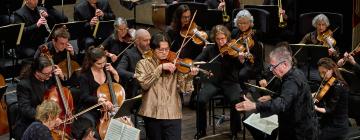The San Francisco Contemporary Music Players performed its first concert of 2008 on Monday. Some last-minute changes to the program affected its theme, as the “Strongbox of American Music” was pried open to accommodate British and French composers who live in the U.S. But judging from the response, the audience didn’t mind the breach of security.
Steven Mackie's Indigenous Instruments possesses the youthful spirit of a Firebird, unfolding as if the composer were lashing out against his own anxiety of influence by telling us, "This is mine." All three movements are structured so that success hinges solely on the freshness of each and every musical idea, which lingers irascibly and threatens to wear out its welcome. It's a huge risk that paid off in this performance, especially in the first movement, where rather perfunctory motives ricochet through the ensemble and get skewed slightly by each instrument's unique microtonal tuning.
These moments highlighted the careful balance of the ensemble. In one section, for example, Tod Brody and Peter Josheff alternated with careful timing so that flute and clarinet were sounding as one indistinguishable, possibly indigenous instrument.
Two solo pieces filled in for Dear Theo, a vocal piece by David Sheinfeld that could not be performed due to the vocalist's illness. These were Brian Ferneyhough's Intermedio alla ciaconna, played by violinist Graeme Jennings, and Philippe Manoury's vibraphone solo from Le Livre des claviers, played by Chris Froh. It was astonishing to see that these were the replacement pieces. That both performers could give such a convincing interpretation of each on short notice is a testament to their dedication and attention to detail.
The Manoury floated in a sea of improvisatory gestures that required Froh to use his hands to quickly stop individual notes from ringing, while the Ferneyhough was more outwardly active and left moments of delicate reflection to the music of Morton Feldman. Jennings' fiery double-stop passagework at the end of the piece was striking for its clarity of shape in the midst of so much activity, and somehow transcended the virtuoso surface of everything that came before it.
Feldman's ethereal Bass Clarinet and Percussion was a combination of hollow timbres and multivalent rhythms. In it, two percussionists play in sync, often in unison — for example, a rototom and a vibraphone softly rolling the same pitch. Unlike other pieces by Feldman, such as Why Patterns? or Vertical Thoughts, time is not so deliberately singular: Here, the unisons reverberate in unexpected ways, and what comes out of the clarinet is a slow, changing procession that gives nooks and crannies to the musical space, making it sound like there's more activity than there really is. Though quite limited in scope, each sound blended so that it was more like watching devoted alchemists at work on stage than performers.
Jonathan Wilkes is a graduate student in theory and composition at UC Davis. He earned a B.A. in music from the University of North Carolina at Chapel Hill in Piano Performance.
